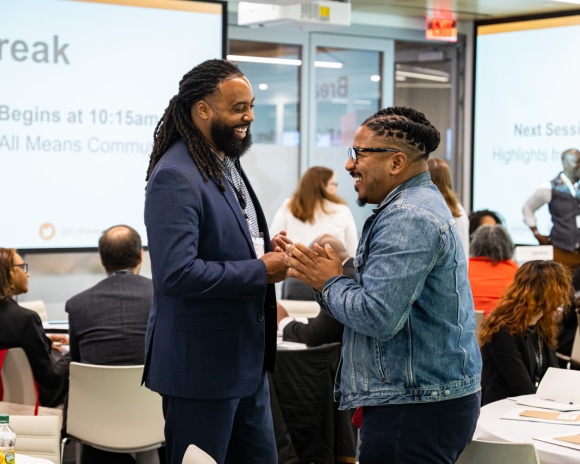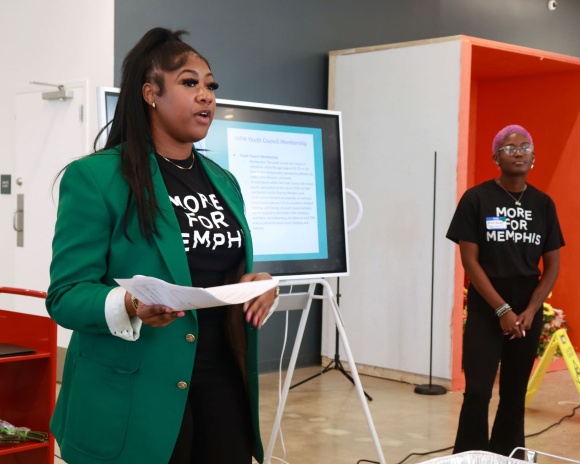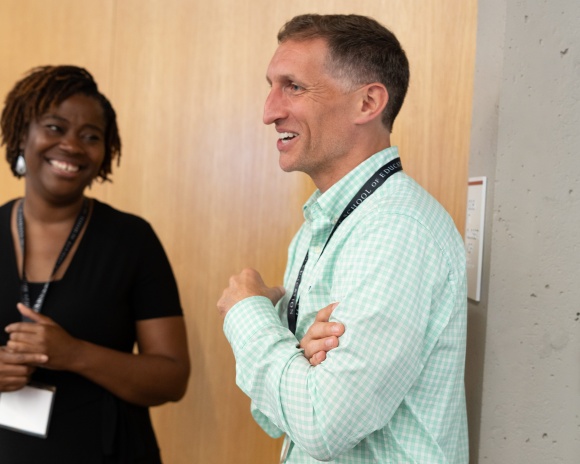EdRedesign Fellowship for Cradle-to-Career Partnership Leaders
Applications for the Fellowship closed on May 3, 2024. Sign up for our newsletter to receive information about future opportunities with us.
A link to the application can be found at the bottom of this page. Please read all of the information on this page before opening the application.
Children and families in communities across the country experience complex, multi-generational, and substantial disparities in education, health, well-being, income, and intergenerational upward mobility. Solutions to address the long-term impacts of racism, poverty, and disinvestment require residents and organizations from all sectors to come together toward shared goals.
Place-based partnerships combine forces across multiple sectors (government, businesses, nonprofits, philanthropies, and community, youth, and faith-based agencies and organizations across health, education, social services, arts, community development, housing, and other fields) and elevate the voices and lived experience of residents to solve complex problems in geographically defined places. By aligning opportunities and supports, these partnerships work to meet local needs. They build on individual and community assets to create cradle-to-career pathways that allow more young people to reach their full potential. However, there are limited training programs that upskill leaders of the backbone or intermediary organizations for these partnerships with the knowledge and tools to facilitate this work. We are changing that.
The EdRedesign Lab at the Harvard Graduate School of Education is launching a competitive, tuition-free 18-month Fellowship program for new and aspiring leaders of cradle-to-career place-based partnerships. This is a unique opportunity to join a network of inspiring change-makers, sharpen your cross-sector skills, and apply new tools, connections, and approaches to improve measurable outcomes for children and families in your community!
You can find answers to frequently asked questions about this field in the Resources and Research section of our website here.

The Fellowship will accelerate your capability to build effective, equitable partnerships that improve conditions for those affected by racism, poverty, and disinvestment.

Think and act across sectors, programs, and cradle-to-career models for your community.

Make decisions and take actions that are grounded in data and authentically center voices of youth and families.

Use your lived experience, professional expertise, and personal strengths to lead community work.

Generate and align human, financial, and technical resources in service of shared, community-level goals.

Lead partners without formal authority towards shared goals, persevering through challenges and setbacks.
Leading across sectors to change places is some of the most challenging work there is. Through my experience with the Purpose Built Communities Network, I’ve seen how impactful it can be when done well. I’m excited that the Harvard EdRedesign Lab is committed to helping more leaders do this important work. – Ben Lewis, Vice President of Innovation and Learning, Purpose Built Communities
This Fellowship is for Executive Directors (EDs) who are new to leading a place-based partnership backbone or intermediary organization or senior-level leaders who could become an ED of an organization committed to leading cradle-to-career, place-based, cross-sector work. Eligible applicants should be based in a defined geography (U.S. urban, suburban, or rural neighborhood, town, tribal area, city, county, or region) where they have committed (and will continue to dedicate) their time, talent, energy, hearts, and minds. For more details on eligibility, see Is This Fellowship For You? below.
This Fellowship will accelerate your capability to build effective, equitable partnerships that improve conditions for those affected by racism and poverty. The Fellowship will help you:
- Think and act across sectors, programs, and cradle-to-career models for your community
- Make decisions and take actions that are grounded in data and authentically center voices of youth and families
- Use your lived experience, professional expertise, and personal strengths to lead community work
- Generate and align human, financial, and technical resources in service of shared, community-level goals
- Lead partners without formal authority towards shared goals, persevering through challenges and setbacks
The Fellowship is grounded in real-world applications and was created in partnership with national field leaders including Partners for Rural Impact, Purpose Built Communities, StriveTogether, and William Julius Wilson Institute at Harlem Children’s Zone.
Over the course of 18 months, fellows will engage in the following components, ultimately receiving a Harvard-credentialed certificate based on program completion and demonstrated improvement in the five competencies above. Key Fellowship program components include:
- Three in-person convenings: In order to facilitate networking with academic experts, field leaders, and each other, the Fellowship includes two learning opportunities hosted at Harvard and one site visit with an exemplary place-based, cradle-to-career partnership.
- Monthly virtual learning: Scaffolded learning opportunities and a community of practice that will meet monthly
- Executive coaching: Ongoing sessions with expert coaches to support fellows’ leadership skills, adult development, and personal goals.
- Community project: Fellows will work on a self-identified community challenge throughout the 18 months, applying the knowledge and skills gained throughout the Fellowship.
- Alumni network: As the inaugural cohort, fellows will be on the ground floor of building a robust network of peer support.
This is an 18-month commitment from October 2024 through April 2026. During the program you will participate in:
- A three-day in-person opening session at Harvard the week of October 14, 2024 (October 15-18, 2024)
- A three-day in-person site visit in the middle of the program
- A three-day in-person closing session at Harvard in April 2026
- Virtual monthly learning sessions with your cohort, Harvard faculty, and national field leaders
On average, fellows should estimate that this program will take about 10-12 hours per month throughout the duration of the program, inclusive of monthly assignments, virtual convenings, coaching sessions, and the community of practice. The expectation is that participation in this program aligns with, and strengthens, fellows’ ongoing community/organizational work. Because of the time fellows must commit to the Fellowship, upon acceptance, we require a letter of support from leadership at your current organization.
Tuition, accommodations, meals, and travel during sessions are fully funded by contributions from our program supporters.
The Mindsets You Hold:
- Deeply Committed to Place: You represent the places you serve with deep knowledge of your community and meaningful, trusted relationships with colleagues, residents, leadership, and partners.
- Equity Champion: You are unequivocally committed to racial and economic equity in all its forms. In response, you work to shift power dynamics so that those affected by a problem are key stakeholders in identifying their needs and co-designing solutions.
- Bold, Strategic, Multi-Sector Collaborator: Knowing that no single sector, organization, or individual can solve disparities in upward mobility, you see yourself as a change agent and are committed to developing a sustainable, local civic infrastructure that fuels social change.
- Poised to Expand Your Impact: You are at a pivotal time in your career, with enough life and professional experience to know what you don’t know and what skills you want to gain. You crave a space with similar visionaries and are driven to sharpen your toolkit so you can accelerate impact in your community.
- Others Want to Build With You: You are humble — you have a growth mindset and believe you can learn from anyone; you embody integrity through your actions; and you inspire others to follow in your footsteps.
The Experience of a Typical Fellow:
- The Next Wave of Backbone Leaders: Executive Directors (ED) who are new to leading a partnership backbone or senior-level leaders who could become an ED of an organization committed to cradle-to-career, place-based, cross-sector work.
- Proximate Leaders: Leaders based in a defined geography (U.S. urban, suburban, or rural neighborhood, town, city, county, or regional) where they have committed (and will continue to dedicate) their time, talent, energy, hearts, and minds.
- Leaders with Demonstrated Impact: Leaders with a proven track record of achieving impact through clear, measurable, data-driven results.
- Decision Makers: Individuals that hold a leadership position with decision-making authority.
- Mid-Career Professionals: Most fellows have approximately 10+ years; Exceptionally qualified candidates with less than 10 years of experience will also be considered.
- A Transformative Project to Drive: You have a specific, community-driven project to spearhead throughout the fellowship that will advance your community and that would benefit from the fellowship.
If you have any questions about the Fellowship, please contact Sagar Desai at sagar_desai@gse.harvard.edu.
The Fellowship is grounded in real-world applications and was created in partnership with national field leaders including Partners for Rural Impact, Purpose Built Communities, StriveTogether, and William Julius Wilson Institute at Harlem Children’s Zone.
About Partners for Rural Impact: Partners for Rural Impact (PRI) is a leading national organization working to ensure that all rural youth ages 0-24 years are on a path to upward mobility. Using a cradle to career and place-based approach, we operate at the local, state, and national levels to accelerate outcomes for the 14 million children and youth living in rural America. To learn more visit partnersrural.org/our-work/.
About Purpose Built Communities: Purpose Built Communities is a national nonprofit that empowers local organizations to revitalize neighborhoods through pro-bono coaching and support, aiming for greater racial equity, improved health and wellness, and increased upward mobility. Each local organization, or Purpose Built Network Member, fosters high-capacity, collaborative efforts for community-led projects that include mixed-income housing, excellent schools, inclusive spaces for health and belonging, and a vibrant local economy. Every project supports the vision of longtime residents, ensuring their legacy and aspirations are central to neighborhood development. To learn more, visit purposebuiltcommunities.org.
About StriveTogether: StriveTogether is a national movement with a clear purpose: help every child succeed in school and in life from cradle to career, regardless of race, ethnicity, zip code or circumstance. In partnership with more than 70 communities across the country, StriveTogether provides resources, best practices and processes to give every child every chance for success. The StriveTogether Cradle to Career Network reaches about 14 million young people, including 8 million children of color and 5 million children experiencing poverty. Learn more at StriveTogether.org.
About William Julius Wilson Institute at Harlem Children’s Zone: William Julius Wilson Institute (WJWI) at Harlem Children’s Zone (HCZ) is the leading authority on and resource for place-based, people-focused solutions that close opportunity gaps nationwide. Led by Geoffrey Canada — founder and president of HCZ — and guided by a generation of evidence, WJWI delivers insights, influence and impact by tailoring solutions locally and scaling results nationally. Together with on-the-ground collaborators and national place-based partners, WJWI opens pathways to social and economic mobility in neighborhoods across America. It is named in honor of one of the nation’s most prolific African American scholars on poverty and inequality. To learn more, visit hcz.org/william-julius-wilson-institute/.
We thank our funders for their support that has made this program possible — a recent $2.5 million implementation grant from Ballmer Group, additional support from Harvard Graduate School of Education Dean’s Impact Fund and The Annie E. Casey Foundation, planning grants from Ballmer Group, Barr Foundation, Carnegie Corporation of New York, and the Schwartz Family Foundation, and general operating support from The Linda G. Hammett Ory & Andrew Ory Charitable Trust and the Schwartz Family Foundation.